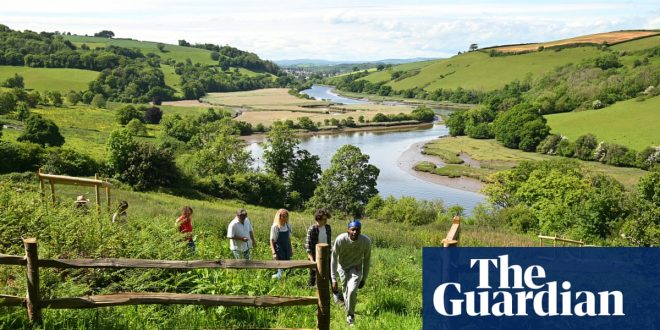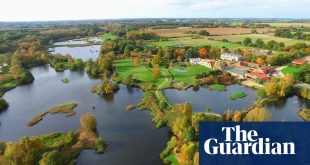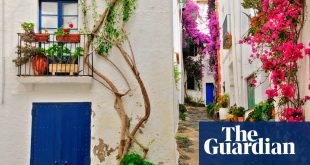We were sitting under a giant sweet chestnut at the top of a steep field tumbling down to the River Dart, like a rivulet of mercury winding north to Totnes and beyond to Dartmoor, whose crooked granite tors look like approving thumbs. Greenfinches chirred and a song thrush went through its dial-up modem repertoire. A lone seal lolloped on the estuary mud, lazily waiting for the tidal river to reclaim it.
“I come into the peace of wild things / who do not tax their lives with forethought / of grief … ”, whispered Frank, leading our group’s nature walk. “… for a time / I rest in the grace of the world, and am free.”
Frank took a long breath, as if to deeply ingest Wendell Berry’s poem, and then asked us to summon up our earliest memories of nature. I saw my five-year-old self, in 1969, on his first trip from the inner city, sprinting up a Lake District hill like an animal sprung from captivity.
This reflection on nature and memory was part of a six-night wildlife discovery and meditation retreat at Sharpham House, an exquisite 18th-century Palladian mansion set in 222 hectares (550 acres) of south Devon parkland, high above an elbow of the Dart. In 1982, Sharpham was turned into a charity by its then owners, Ruth and Maurice Ash, and dedicated to helping people cope with the stresses of modern living.
Unsurprisingly, in 2024 it finds itself more in demand than ever. It offers a growing range of meditation courses, all with nature at their core, and four retreat centres, the newest of which – the Coach House, converted from a Grade-II listed stable yard in 2022 – I was staying at.
I was hoping that Sharpham might help with my anxiety: once an occasional visitor, now a perennial guest, seemingly agitated by every fresh convulsion in our world. Our days started with a gentle wake-up bell at 7am – no phone alarms for us, as Sharpham requests devices be handed in – followed by 15 minutes of qigong, a series of slow movements and breathing exercises, under a sprawling 1,500-year-old yew, a tree revered by the ancients as a symbol of death and resurrection. Most of us were barefoot in the dewy grass, the electric jolts of cold shocking.
Afterwards, the group, myself and 12 women, aged from about 25 to 75, walked slowly and soundlessly – retreat guests are silent from 9pm until after breakfast – to the Coach House’s meditation room. There, we were led through a practice by the retreat’s two coordinators, Caroline and Jude, focusing on the breath.
Breakfast in silence on the first morning was disconcerting. In what would ordinarily have been a time of excited communion with strangers, we sat and focused on the food on our plates – the colours, the smells, the flavours. My knife against the plate sounded like a train on a tight curve. After a few slow, mindful mouthfuls, I was full. As the week progressed, that silence for a few hours after waking felt increasingly sublime and spacious, divine almost – one member of our group would later describe it as “timeless time”.
That first morning was Frank’s nature walk (he, like all of the coordinators, was a volunteer, taking a year’s sabbatical from his usual life). He told us about Sharpham’s rewilding drive, now in its fourth year, where the crops, vineyards and most of the sheep had been removed, wildflower meadows sown, and animals such as mangalica pigs and konik ponies introduced to roam freely, with the aim of replicating the actions on the land of their wild ancestors, boar and tarpans respectively.
After lunch, always vegetarian, always fabulous – Sharpham’s organic kitchen garden provided many of the ingredients, and the menu during my week included aubergine and tofu curry, apricot and fennel tagine, cashew chocolate cheesecake and cheeses from the Sharpham Dairy – afternoons were generally free of formal activities.
These I spent wandering around the Capability Brown-designed gardens, or through the fabulous woodlands of redwood, holm oaks and handkerchief trees, fat and full in June, walking slowly, inhaling deeply, with intention and curiosity. Every few steps, I would stop to stare in wonder at rows of pennywort, standing tall as if on parade, presenting their delicate little golden bells for inspection, or clusters of cerulean alkanet.
On other days I walked, chaperoned by gyring swallows, through the wildflower meadows, planted only last year yet already a riotous profusion of clover, cornflowers, poppies, oxeye daisies and, vitally, yellow rattle, known as the meadow-maker for its role in balancing soil after intensive grazing. Nearly always, I ended up at the river, for hours, watching its tidal breath as cormorants skimmed across its whorls, their pulsing wings like heartbeats.
after newsletter promotion
Every evening there was an hour of group meditation, often prefixed by retreatants being invited to share their feelings. There was much talk of grief and loss, of lingering Covid trauma, of struggles with the demands of modern life. We were invited to lie down and close our eyes as Caroline gently called out our names, one by one, and invited the group to send us love and care and asked that we do the same to ourselves. By 9pm we were all in bed. Who knew being so relaxed could be so exhausting?
Other nature experiences during the week included a wildflower and foraging safari, where we ate oxeye daisies, traditionally used to treat sore throats, zingy sorrel flowers and the leaves of lemon verbena, which tasted like sherbet; and a bug safari, where we dashed around with nets in the long grass with childlike glee and rushed back to Fraser, the insect expert, to proudly show him our haul. There were bird walks, walks focused on trees or moths, or the tiny lesser horseshoe bats that flittered out in the crepuscule from their roost in the Coach House roof, and to whose chattering echolocations we listened on bat detectors. Sometimes, we walked just paying attention to the rhythm of our feet and our breath.
On our final evening, we sat in a circle under the ancient yew tree around a fire bowl. We sang a song together. There was laughter, not an iota of judgment. Each of us was given a pine cone to project something on to we wished to leave behind before committing it to the flames. The old me would have said “cynicism”, especially of such rituals, but I seemed to have been relieved of that, so instead I went for “anxiety”, and the group intoned: “Let it be so.” And then we sat, in silence, resting in the grace of the world.
Wherever You Go, There You Are is the title of Jon Kabat-Zinn’s seminal 1994 book on mindfulness meditation, from a saying often attributed to Confucius. Whenever I’d heard it, it had always felt like a curse. As I drove away from Sharpham House, it felt just a little more like a blessing.
Mike Carter was a guest of the Sharpham Trust on its six-night Wildlife Discovery retreat. The standard cost is £545, although guests can select different rates according to need. This includes accommodation in a single room, all food and drink, and expert-led walks and talks
 Top Naija News – Nigeria News, Nigerian News & Top Stories Top Naija News – Nigerian Newspapers, Nigerian News. topnaijanews is a daily Nigerian newspaper covering Latest News, Breaking News, Entertainment, Sports, Lifestyle and Politics.
Top Naija News – Nigeria News, Nigerian News & Top Stories Top Naija News – Nigerian Newspapers, Nigerian News. topnaijanews is a daily Nigerian newspaper covering Latest News, Breaking News, Entertainment, Sports, Lifestyle and Politics.




